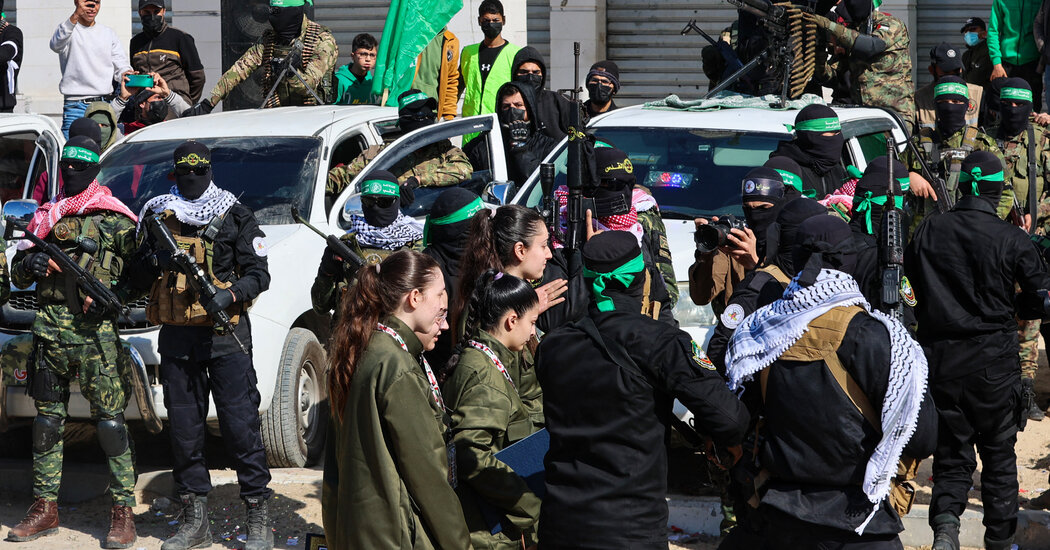Useful information
Prime News delivers timely, accurate news and insights on global events, politics, business, and technology
Useful information
Prime News delivers timely, accurate news and insights on global events, politics, business, and technology

Hamas freed four female Israeli army soldiers on Saturday as part of a hostage-for-prisoner exchange, more than a year after the women were taken captive during the Hamas-led attack on southern Israel on October 7, 2023. , which started the war. .
In a choreographed release, the four hostages wore military-style uniforms as they walked toward a stage in Gaza City. They waved and smiled at a cheering crowd, smiling at each other as balaclava-clad Hamas fighters surrounded them.
The hostage release is part of a 42-day ceasefire agreement that came into effect on Sunday, halting fighting between Israel and Hamas. Hamas agreed to gradually release 33 of the nearly 100 remaining hostages in exchange for more than 1,000 Palestinians imprisoned by Israel and a partial Israeli withdrawal.
The hostages had recently been recruited and were working as “observers” for the Israeli army, reporting on suspicious activities across the border. During the Hamas-led attack, militants stormed the Nahal Oz military base in Israel, killing more than 50 soldiers and kidnapping the women, who were teenagers at the time, and three other female soldiers.
In May, the Israeli military released a collection of edited three-minute videos, verified by The New York Times, showing Palestinian fighters, some wearing Hamas headbands, tying the hands of five women, including the four who were released on Saturday. The footage was recorded by body cameras worn by the Hamas militants who kidnapped them, according to the Hostage and Missing Families Forum, which represents relatives of many of the captives.
Here’s what we know about the four freed hostages.
Albag, who dreamed of becoming an architect and interior designer, joined the Israeli military shortly after graduating from high school, according to a statement from the Hostage Families Forum.
His family expressed relief and joy upon seeing his release. “Far from what I expected, she looks vibrant,” Ruhama Albag, her aunt, said live on television. “She is cheerful, she waves her hand and her spirit is unbreakable.”
In January, Hamas’s military wing released an edited video of Albag, now 19, speaking for three and a half minutes, in which she said she had been detained for more than 450 days.
In a statement at the time, Albag’s family said “his severe psychological distress” was evident in the video and called on Israel’s Prime Minister Benjamin Netanyahu and other leaders to “make decisions as if their own children were there.” .
“She is only tens of kilometers from us, but for 456 days we have not been able to bring her home,” the family said.
Ms. Ariev, 20, is the daughter of immigrants from Ukraine and was described by her family as “the connecting force” between friends and family, the family forum said.
He called his parents during the attack, described the militants firing guns and rockets, and told them he loved them, according to the Israeli media. That same day, her family found a Hamas video posted on social media showing Ms. Ariev and two other women in a jeep, their faces bleeding, they said.
In August, Ms. Ariev’s older sister, Sasha Ariev, he said at an event in Jerusalem spoke of moving home after the Oct. 7 attack to help her parents who felt increasingly helpless.
Ariev’s sister said the hostage crisis was consuming her. “How can I sleep if we haven’t managed to bring Karina and all the other hostages home?” she said. “How can I sleep if I’m in my bed and she’s a hostage?”
Daniella Gilboa, 20, is from Petah Tikva, central Israel. At the time of his kidnapping, Gilboa had been studying piano and hoped to perform professionally one day, the forum said.
In July, Ms. Gilboa’s family released a video made by Hamas that they had received months earlier, which showed her and Mrs. Ariev in captivity.
In an interview with Maariv, an Israeli newspaper, the father of Gilboa’s boyfriend said the family had mixed emotions about the video. “In his family there is a feeling of relief along with a feeling of disappointment,” he said.
Naama Levy, now also 20, is a triathlete who grew up in Raanana, a leafy city north of Tel Aviv, the forum said.
She texted her mother from a safe room on the day of the attack, according to a website focused on campaigning for her release. “I’ve never heard anything like that” she wrote.
A Hamas video of its transfer to Gaza circulated on social media shortly after the attack.
In an interview for a documentary about sexual violence during the attack, Ayelet Levy Sachar, Naama’s mother, spoke of her daughter’s kidnapping. In a Hamas video she was seen in pajama pants, soaked in blood.
“They are grabbing her by the hair and she is like a mess,” he said, adding: “We would like to think that this couldn’t be possible, that no one would hurt a girl. But then you see it there.”